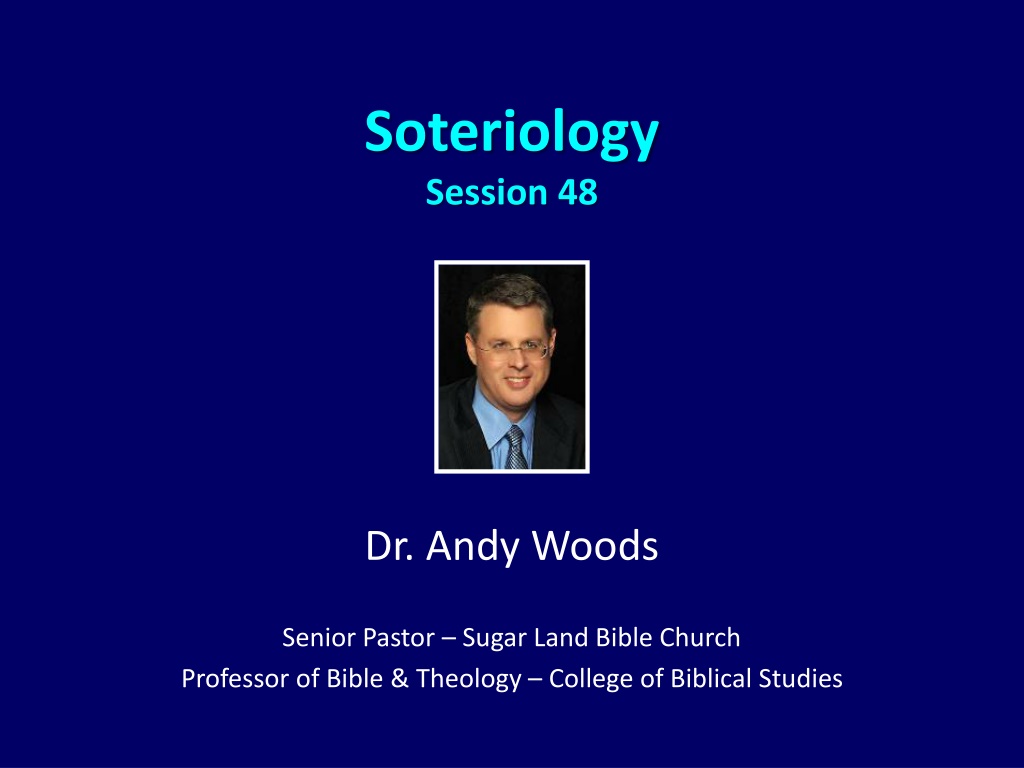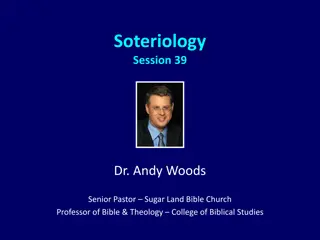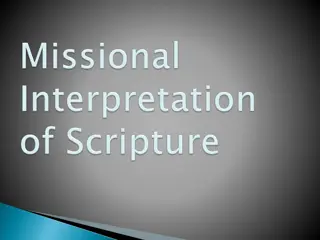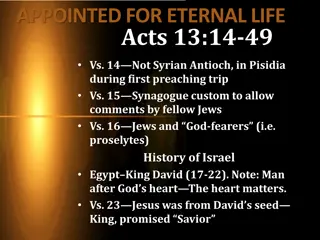Understanding Eternal Security in Soteriology Session with Dr. Andy Woods
Delve into the concept of Eternal Security as explained by Dr. Andy Woods in Soteriology Session 48. Learn about the assurance of salvation for those genuinely saved through faith in Christ alone, and explore responses to challenging passages addressing this doctrine.
Download Presentation

Please find below an Image/Link to download the presentation.
The content on the website is provided AS IS for your information and personal use only. It may not be sold, licensed, or shared on other websites without obtaining consent from the author. Download presentation by click this link. If you encounter any issues during the download, it is possible that the publisher has removed the file from their server.
E N D
Presentation Transcript
Soteriology Session 48 Dr. Andy Woods Senior Pastor Sugar Land Bible Church Professor of Bible & Theology College of Biblical Studies
Soteriology Overview I. II. III. IV. V. VI. VII. Eternal security VIII. Faulty views of salvation Definition Election Atonement Salvation words God s one condition of salvation Results of salvation
Soteriology Overview This Session VII. Eternal Security
Definition of Eternal Security Eternal Security means that those who have been genuinely savedby God s grace through faith alone in Christ alone shall never be in danger of God s condemnation or loss of salvation but God s grace and power keep them forever saved and secure. Dennis Rokser, Shall Never Perish Forever, p. 11
Eternal Security Outline 1. Eternal security arguments 2. Response to problem passages
Eternal Security Outline 1. Eternal security arguments 2. Response to problem passages
Eternal Security Outline 1. Eternal security arguments 2. Response to problem passages
Response to Problem Passages 1. OT Passages 2. Passages from Matthew 3. Passages from John 4. Passages from Acts 5. Passages from Paul
Response to Problem Passages 6. Passages from James 7. Passages from Hebrews 8. Passages from 2 Peter 9. Passages from 1 John 10.Passages from Revelation 11.Miscellaneous argument
Passages from the General Letters & Revelation a. Jas. 5:19-20 h. Jude 11 b. Heb. 3:6, 14 i. 1 John 2:3 c. Heb. 5:9-10 j. 1 John 3:9 d. Heb. 6:4-6 k. 1 John 3:15 e. Heb. 10:26-30 l. 1 John 5:16 f. Heb. 12:14 m. Rev. 3:5 g. 2 Pet. 1:10-11, 20-22 n. Rev. 22:18-19
Passages from the General Letters & Revelation a. Jas. 5:19-20 h. Jude 11 b. Heb. 3:6, 14 i. 1 John 2:3 c. Heb. 5:9-10 j. 1 John 3:9 d. Heb. 6:4-6 k. 1 John 3:15 e. Heb. 10:26-30 l. 1 John 5:16 f. Heb. 12:14 m. Rev. 3:5 g. 2 Pet. 1:10-11, 20-22 n. Rev. 22:18-19
1 John 2:3 By this we know that we have come to know Him, if we keep His commandments. (NASB)
Believing Audience 1 John 1:4; 2 John 12 Loss of joy 1 John 1:8 We 1 John 2:1, 18, 28; 3:2, 7, 18; 5:21 Children of God 1 John 2:12-14 Eight descriptions 1 John 2:20, 27 Have the Spirit s anointing 1 John 2:28; 2 John 8 Loss of reward
Believing Audience 1 John 3:1-2 Those who will be like Him 1 John 3:2, 21; 4:1, 7, 11 Beloved ones in the faith 1 John 3:13 My brothers 1 John 4:4 Born of God 1 John 4:13 Possessing the Holy Spirit
7 Tests in 1 John
What is Being Tested? Test of life saved, union, justification Test of fellowship fellowship with God, communion, sanctification
Three Tenses of Salvation Phase Justification Sanctification Glorification Tense Past Present Future Saved from sin s: Penalty Power Presence Eph 2:8-9; Titus 3:5 Scripture Philip 2:12 Rom 5:10
Three Tenses of Salvation Phase Justification Sanctification Glorification Tense Past Present Future Saved from sin s: Penalty Power Presence Eph 2:8-9; Titus 3:5 Scripture Philip 2:12 Rom 5:10
John F. MacArthur, Saved Without a Doubt? How to be Sure of Your Salvation (Wheaton, IL: Victor, 1988), 67-91. John MacArthur claims that John wrote this epistle to provide "eleven tests" of genuine saving faith. These include such subjective questions as: "Do you obey God's Word?" "Do you reject this evil world?" "Do you eagerly await Christ s return?" and "Do you see a decreasing pattern of sin in your life?.
Christopher D. Bass, That You May Know: Assurance of Salvation in 1 John (Nashville, TN: Broadman and Holman, 2008), 182-83. We must remember that the first letter of John is laden with various sets of criteria or tests by which its readers are to evaluate their religious claims in light of the way they conduct their lives. The believers life style therefore serves as either a vital support to his or her assurance or is evidence that he has never really passed over from death to life.
Three Tenses of Salvation Phase Justification Sanctification Glorification Tense Past Present Future Saved from sin s: Penalty Power Presence Eph 2:8-9; Titus 3:5 Scripture Philip 2:12 Rom 5:10
2 VIEWS OF 1 JOHN TEST OF LIFE VIEW TEST OF FELLOWSHIP VIEW If you have righteous conduct, love, and truth then you know you were saved If you have righteous conduct, love, in truth then you know you re in fellowship with God Summary 1 Jn 5:13, so that you may know that you have eternal life 1 Jn 1:3, so that you also may have fellowship with us (and) with the Father and with His Son Purpose Statement Being saved, being in union with God (in Christ) Being in communion with God (walking in His Spirit) Fellowship, Abiding Possessing eternal life Enjoying fellowship with God Knowing God Salvation (Jn 17:3) Quality of life (Jn 10:10) Eternal Life Being saved or being lost Being in fellowship with God or being out of fellowship Light or Darkness
Test of Life vs Fellowship TEST OF LIFE TEST OF FELLOWSHIP Summary saved in fellowship Purpose statement 5:13 1:3-4 Fellowship, abiding union Communion (John 15:5) Knowing God eternal life fellowship with God Eternal life John 17:3 John 10:10; Gal. 6:8 Light/darkness saved/unsaved in/out of fellowship Judgment/fear Hell (John 5:24) Discipline/Bema (2 Cor. 5:10) Spirit Possession (Rom 8:9) Influence (Gal 5:16; 1 Thess. 5:19) Satan Unbeliever (John 8:44) Influence upon believer (Matt 16:21-23; Acts 5:3; Eph 4:26-27)
1 John 2:3 By this we know that we have come to know Him, if we keep His commandments. (NASB)
1 John 2:3 Other purpose statements in 1 John cover only what immediately follows (2:1 & 1:5-10; 2:26 & 2:18-25) 1 John 5:13 is notthe book s purpose statement 1 John 1:3-4 is the book s purpose statement Heading in Scofield Reference Bible: The Tests of Fellowship: Obedience and Love. Knowing God refers to intimacy or fellowship with God rather than being born again Out of fellowship believers do not know God (John 14:7-9; Gal. 4:9; 1 Cor. 15:34; 2 Pet. 3:18) Keeping God s commandments to know God (gain or keep salvation) contradicts Ephes. 2:8-9. Dennis Rokser, Shall Never Perish Forever, p. 292-94
1 John 2:3 Other purpose statements in 1 John cover only what immediately follows (2:1 & 1:5-10; 2:26 & 2:18-25) 1 John 5:13 is notthe book s purpose statement 1 John 1:3-4 is the book s purpose statement Heading in Scofield Reference Bible: The Tests of Fellowship: Obedience and Love. Knowing God refers to intimacy or fellowship with God rather than being born again Out of fellowship believers do not know God (John 14:7-9; Gal. 4:9; 1 Cor. 15:34; 2 Pet. 3:18) Keeping God s commandments to know God (gain or keep salvation) contradicts Ephes. 2:8-9.
1 John 2:3 Other purpose statements in 1 John cover only what immediately follows (2:1 & 1:5-10; 2:26 & 2:18-25) 1 John 5:13 is not the book s purpose statement 1 John 1:3-4 is the book s purpose statement Heading in Scofield Reference Bible: The Tests of Fellowship: Obedience and Love. Knowing God refers to intimacy or fellowship with God rather than being born again Out of fellowship believers do not know God (John 14:7-9; Gal. 4:9; 1 Cor. 15:34; 2 Pet. 3:18) Keeping God s commandments to know God (gain or keep salvation) contradicts Ephes. 2:8-9.
1 John 5:13 These things I have written to you who believe in the name of the Son of God, so that you may know that you have eternal life. (NASB)
1 John 2:3 Other purpose statements in 1 John cover only what immediately follows (2:1 & 1:5-10; 2:26 & 2:18-25) 1 John 5:13 is not the book s purpose statement 1 John 1:3-4 is the book s purpose statement Heading in Scofield Reference Bible: The Tests of Fellowship: Obedience and Love. Knowing God refers to intimacy or fellowship with God rather than being born again Out of fellowship believers do not know God (John 14:7-9; Gal. 4:9; 1 Cor. 15:34; 2 Pet. 3:18) Keeping God s commandments to know God (gain or keep salvation) contradicts Ephes. 2:8-9.
1 John 1:3-4 what we have seen and heard we proclaim to you also, so that you too may have fellowship with us; and indeed our fellowship is with the Father, and with His Son Jesus Christ. 4These things we write, so that our joy may be made complete. (NASB)
1 John 2:3 Other purpose statements in 1 John cover only what immediately follows (2:1 & 1:5-10; 2:26 & 2:18-25) 1 John 5:13 is not the book s purpose statement 1 John 1:3-4 is the book s purpose statement Heading in Scofield Reference Bible: The Tests of Fellowship: Obedience and Love. Knowing God refers to intimacy or fellowship with God rather than being born again Out of fellowship believers do not know God (John 14:7-9; Gal. 4:9; 1 Cor. 15:34; 2 Pet. 3:18) Keeping God s commandments to know God (gain or keep salvation) contradicts Ephes. 2:8-9.
1 John 2:3 By this we know that we have come to know Him, if we keep His commandments. (NASB)
1 John 2:3 Other purpose statements in 1 John cover only what immediately follows (2:1 & 1:5-10; 2:26 & 2:18-25) 1 John 5:13 is not the book s purpose statement 1 John 1:3-4 is the book s purpose statement Heading in Scofield Reference Bible: The Tests of Fellowship: Obedience and Love. Knowing God refers to intimacy or fellowship with God rather than being born again Out of fellowship believers do not know God (John 14:7-9; Gal. 4:9; 1 Cor. 15:34; 2 Pet. 3:18) Keeping God s commandments to know God (gain or keep salvation) contradicts Ephes. 2:8-9.
1 John 2:3 Other purpose statements in 1 John cover only what immediately follows (2:1 & 1:5-10; 2:26 & 2:18-25) 1 John 5:13 is not the book s purpose statement 1 John 1:3-4 is the book s purpose statement Heading in Scofield Reference Bible: The Tests of Fellowship: Obedience and Love. Knowing God refers to intimacy or fellowship with God rather than being born again Out of fellowship believers do not know (gn sis,gin sk ) God (John 14:7-9; 1 Cor. 15:34; 2 Pet. 3:18) Keeping God s commandments to know God (gain or keep salvation) contradicts Ephes. 2:8-9.
2 Peter 3:17-18 You therefore, beloved, knowing this beforehand, be on your guard so that you are not carried away by the error of unprincipled men and fall from your own steadfastness, but grow in the grace and knowledge of our Lord and Savior Jesus Christ. To Him be the glory, both now and to the day of eternity. Amen. (NASB)
1 John 2:3 Other purpose statements in 1 John cover only what immediately follows (2:1 & 1:5-10; 2:26 & 2:18-25) 1 John 5:13 is not the book s purpose statement 1 John 1:3-4 is the book s purpose statement Heading in Scofield Reference Bible: The Tests of Fellowship: Obedience and Love. Knowing God refers to intimacy or fellowship with God rather than being born again Out of fellowship believers do not know God (John 14:7-9; Gal. 4:9; 1 Cor. 15:34; 2 Pet. 3:18) Keeping God s commandments to know God (gain or keep salvation) contradicts Ephes. 2:8-9.
1 John 2:3 By this we know that we have come to know Him, if we keep His commandments. (NASB)
Ephesians 2:8-9 "For by grace you have been saved through faith; and that not of yourselves, it is the gift of God; not as a result of works, so that no one may boast."
Passages from the General Letters & Revelation a. Jas. 5:19-20 h. Jude 11 b. Heb. 3:6, 14 i. 1 John 2:3 c. Heb. 5:9-10 j. 1 John 3:9 d. Heb. 6:4-6 k. 1 John 3:15 e. Heb. 10:26-30 l. 1 John 5:16 f. Heb. 12:14 m. Rev. 3:5 g. 2 Pet. 1:10-11, 20-22 n. Rev. 22:18-19
1 John 3:9 No one who is born of God practices sin, because His seed abides in him; and he cannot sin, because he is born of God. (NASB)
1 John 3:9 I. The believer never sins? (1 John 1:8-10; Rom. 6:12-14) II. The believer cannot habitually practice sin? A. Misuse of the present tense B. Book ends (1 John 1:9; 5:16) C. Biblical examples D. Practical problem E. Denial of the assurance of salvation III. Better solution: fellowship focus IV. Context A. 1 John 2:28ff; 3:6, 7 B. 1 John 3:9 Dennis Rokser, Shall Never Perish Forever, p. 277-87
1 John 3:9 I. The believer never sins? (1 John 1:8-10; Rom. 6:12-14) II. The believer cannot habitually practice sin? A. Misuse of the present tense B. Book ends (1 John 1:9; 5:16) C. Biblical examples D. Practical problem E. Denial of the assurance of salvation III. Better solution: fellowship focus IV. Context A. 1 John 2:28ff; 3:6, 7 B. 1 John 3:9 Dennis Rokser, Shall Never Perish Forever, p. 277-87
1 John 3:9 I. The believer never sins? (1 John 1:8-10; Rom. 6:12-14) II. The believer cannot habitually practice sin? A. Misuse of the present tense B. Book ends (1 John 1:9; 5:16) C. Biblical examples D. Practical problem E. Denial of the assurance of salvation III. Better solution: fellowship focus IV. Context A. 1 John 2:28ff; 3:6, 7 B. 1 John 3:9 Dennis Rokser, Shall Never Perish Forever, p. 277-87
1 John 3:9 I. The believer never sins? (1 John 1:8-10; Rom. 6:12-14) II. The believer cannot habitually practice sin? A. Misuse of the present tense B. Book ends (1 John 1:9; 5:16) C. Biblical examples D. Practical problem E. Denial of the assurance of salvation III. Better solution: fellowship focus IV. Context A. 1 John 2:28ff; 3:6, 7 B. 1 John 3:9 Dennis Rokser, Shall Never Perish Forever, p. 277-87
W. Hall Harris III, 1, 2, 3 John: Comfort and Counsel for a Church in Crisis (Biblical Studies Press, 2003), 143. A popular interpretation of these verses distinguishes between occasional sin (which every Christian commits) and a continuing lifestyle of sin, which a genuine Christian cannot pursue. Appeal is usually made to the present tense to support this view. The Greek present tense describes ongoing action (action in progress). The problem with this view is that the author of 1 John does not appear to distinguish anywhere else between lifestyle of sin and occasional acts of sin. Also, to make a significant interpretive point on the basis of the Greek text alone is extremely subtle. One can only wonder whether John's readers would've gotten the point.
1 John 3:9 I. The believer never sins? (1 John 1:8-10; Rom. 6:12-14) II. The believer cannot habitually practice sin? A. Misuse of the present tense B. Book ends (1 John 1:9; 5:16) C. Biblical examples D. Practical problem E. Denial of the assurance of salvation III. Better solution: fellowship focus IV. Context A. 1 John 2:28ff; 3:6, 7 B. 1 John 3:9 Dennis Rokser, Shall Never Perish Forever, p. 277-87
1 John 1:9 If we confess our sins, He is faithful and righteous to forgive us our sins and to cleanse us from all unrighteousness. (NASB)
1 John 5:16 If anyone sees his brother committing a sin not leading to death, he shall ask and God will for him give life to those who commit sin not leading to death. There is a sin leading to death; I do not say that he should make request for this. (NASB)
1 John 3:9 I. The believer never sins? (1 John 1:8-10; Rom. 6:12-14) II. The believer cannot habitually practice sin? A. Misuse of the present tense B. Book ends (1 John 1:9; 5:16) C. Biblical examples D. Practical problem E. Denial of the assurance of salvation III. Better solution: fellowship focus IV. Context A. 1 John 2:28ff; 3:6, 7 B. 1 John 3:9 Dennis Rokser, Shall Never Perish Forever, p. 277-87
1 John 3:9 I. The believer never sins? (1 John 1:8-10; Rom. 6:12-14) II. The believer cannot habitually practice sin? A. Misuse of the present tense B. Book ends (1 John 1:9; 5:16) C. Biblical examples D. Practical problem E. Denial of the assurance of salvation III. Better solution: fellowship focus IV. Context A. 1 John 2:28ff; 3:6, 7 B. 1 John 3:9 Dennis Rokser, Shall Never Perish Forever, p. 277-87























